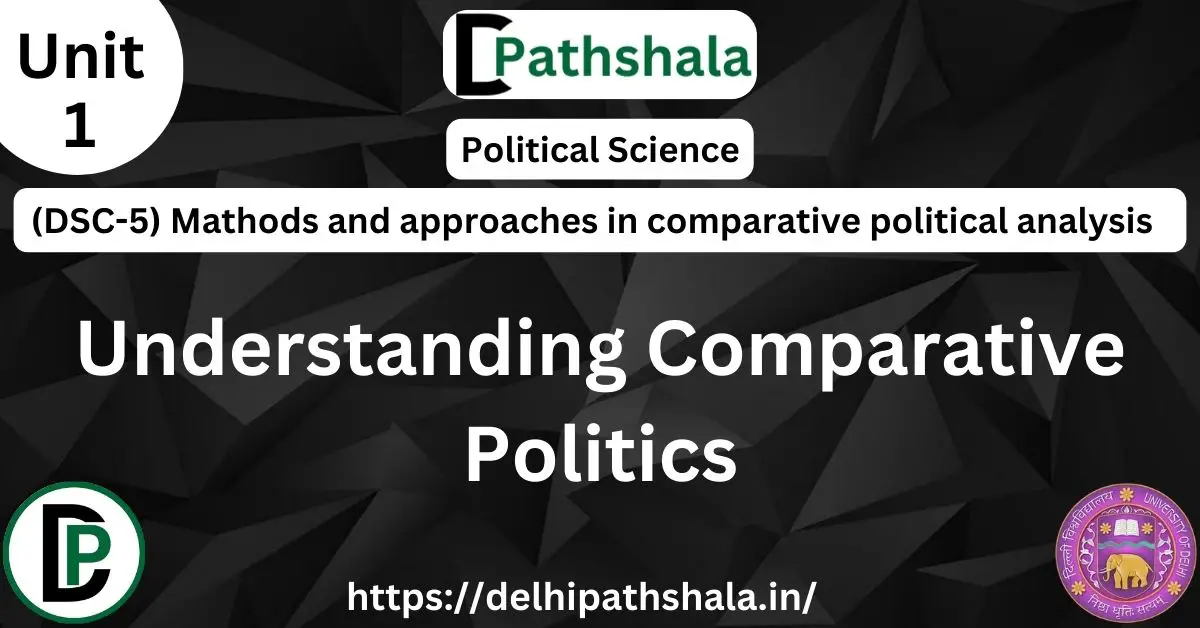In this post, notes of “Unit 1: Understanding Comparative Politics” from “DSC – 5: Mathods and approaches in comparative political analysis” are given which is helpful for the students doing graduation this year.
Nature and scope of comparative politics
Nature of comparative politics
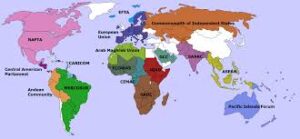
What is Comparative Politics?
Comparative Politics is a part of political science that studies and compares how different countries and regions run their governments.
It looks at how political systems work, what affects political results, and how history, culture, and institutions influence how power is shared.
Key parts of Comparative Politics include:
– Comparing political systems: Such as Parliamentary vs. Presidential or Federal vs. Unitary.
– Studying institutions: Like governments, legislatures, election systems, and constitutions.
– Analyzing political behavior: Including voting habits, public participation, and opinions.
– Comparing countries and regions: Using examples from various places to see common trends.
In short, Comparative Politics helps scholars understand political behavior and how institutions work by finding both differences and similarities among systems.
| You can also read related topics | |
|---|---|
| Approaches to Studying Comparative Politics | what is New Institutionalism and Old Institutionalism |
Importance of Comparative Politics
The importance of Comparative Politics in political science can be seen in these points:
- Better Understanding of Political Systems:
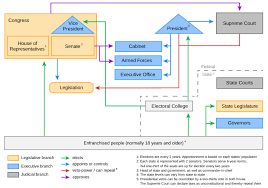
– Comparing different systems helps scholars see the strengths and weaknesses of each type of government.
– It explains why some systems are more stable or democratic and what leads to political success or failure.
- Building and Testing Theories:
– Comparative Politics aids political scientists in creating and testing theories.
Studying different cases helps in understanding ideas like democratization and authoritarianism.
- Policy Analysis and Application:
– Governments and organizations use insights from comparisons to create better policies.
– For example, learning from successful democracies can help improve governance in developing countries.
- Understanding Global Political Trends:
– Comparative Politics helps to spot global trends like the rise of populism or changes in democracy.
– It aids in predicting political changes and understanding how economics, society, and technology affect political systems.
- Encouraging Global Awareness and Diversity:
– Comparing countries helps students and scholars appreciate different cultures and institutions.
– It promotes understanding of how local history, culture, and geography influence political choices and outcomes.
In summary, Comparative Politics is essential for learning how different political systems function, improving governance, and advancing political science through research and theory development.
| Related Topics | |
|---|---|
| types of political culture in comparative politics | Approaches to Studying Comparative Politics: Political Economy |
Historical Development of coparative politics
Evolution of Comparative Politics
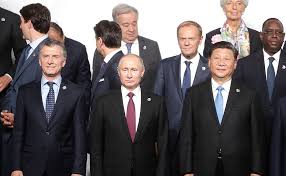
Comparative Politics is a branch of political science that has changed over many years, starting from simple descriptions of political systems to more detailed and theory-based studies.
- Early Days (Classical Foundations):
– The roots of Comparative Politics can be traced back to ancient thinkers like Aristotle. In his book Politics, he compared different government types in ancient Greece, categorizing them as monarchies, aristocracies, and democracies. He focused on what makes a good political system.
- 19th Century – Beginning of Comparative Method:
– The formal study of Comparative Politics began in the 1800s. Early thinkers like Montesquieu (in The Spirit of the Laws) looked at different political systems and how they affect freedom.
He introduced the idea of separation of powers in government, which is still important today.
– Karl Marx analyzed political systems based on economic factors and social classes, emphasizing how economies shape political structures.
- Early 20th Century – Institutionalism:
– In the early 1900s, Comparative Politics focused on comparing formal institutions like laws and government structures (e.g., parliaments).
This method, called institutionalism, looked at how these institutions affect political results.
– Scholars like Max Weber studied the role of bureaucracies and authority in shaping political systems.
- Post-World War II – Behavioral Revolution:
– In the 1950s and 1960s, there was a big change with the behavioral revolution. This movement focused on studying real political behavior (like voting) instead of just institutions. Researchers started using surveys and statistics.
– Gabriel Almond and Sidney Verba’s study The Civic Culture (1963) was important in showing how culture affects political behavior.
- Late 20th Century – New Institutionalism and Modern Comparative Politics:
– In the late 1900s, scholars combined institutional analysis with behavioral studies, creating new institutionalism. This approach considered both formal institutions and informal practices.
– Topics like democratization, authoritarianism, and globalization became more important, with researchers using large data sets and case studies.
- Today’s Trends:
– Today, Comparative Politics includes ideas from various fields like economics and sociology. Important topics include democratization, political development, identity politics, and the effects of globalization on local politics.
– Research methods have become more advanced, using both quantitative and qualitative techniques.
Main Theorists and Contributions
- Aristotle (384–322 BCE)

– Considered the first political scientist, Aristotle’s work in Politics categorized different governments and analyzed their strengths and weaknesses.
- Montesquieu (1689–1755)
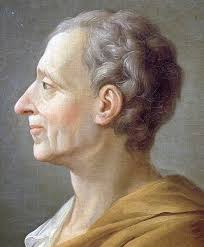
– In The Spirit of the Laws (1748), Montesquieu compared political systems and introduced the idea of the separation of powers.
- Karl Marx (1818–1883)

– Marx’s approach looked at how economic conditions relate to political structures and class relations.
- Max Weber (1864–1920)

– Weber studied bureaucracies and different types of authority, helping to understand governance.
- Gabriel Almond (1911–2002)
– Almond focused on political culture and how cultural values impact politics, notably in his study The Civic Culture (1963).
- Samuel P. Huntington (1927–2008)

– Huntington examined political development and democratization, contributing to the understanding of political changes.
- Robert Dahl (1915–2014)

– Dahl’s studies on democracy and pluralism introduced concepts like polyarchy, analyzing how democratic systems work.
- Arend Lijphart (b. 1936)
– Lijphart researched consociational democracy and electoral systems, focusing on how divided societies can achieve stable governance.
In summary, Comparative Politics has evolved from basic analysis to a complex field that combines different methods and perspectives, making it crucial in political science.
Scope of Comparative Politics

Areas of Study
Comparative Politics studies various topics related to politics within countries. Here are the main areas of study:
- Political Systems and Regimes:
– It looks at different types of political systems like democracies and authoritarian governments. It compares how these systems work and how power is shared.
– This includes examining presidential and parliamentary systems and how federal and unitary systems differ.
- Constitutions and Legal Systems:
– This area studies how constitutions are created and operate in different countries.
– It compares court systems and how laws impact politics and people’s rights.
- Electoral Systems and Voting Behavior:
– It compares different voting systems and how they affect election results.
– This includes studying how people vote, election processes, party systems, and what influences voter turnout.
- Political Parties and Interest Groups:
– This area focuses on the role of political parties and groups in different political systems.
– It looks at how parties form coalitions and how interest groups affect laws and political representation.
- Political Culture and Ideology:
– Political culture includes the values and beliefs that influence political actions in different countries.
– This study examines how political ideas like liberalism or socialism affect political systems.
- Governance and Policy-Making:
– It studies how governments make decisions and put policies into action, comparing how different governments manage issues like healthcare and education.
- Political Development and Change:
– This area looks at how political systems change over time, including how democracies develop and how political institutions grow or shrink.
- Identity Politics:
– It examines how factors like ethnicity, religion, and gender affect political outcomes and participation.
- Conflict, Revolutions, and Political Violence:
– This area studies the causes of political violence, including wars and revolutions, and how to resolve conflicts.
- Political Economy:
– It looks at how political and economic systems interact, including the study of different economic systems and how they affect politics.
Comparative Politics vs. International Relations
| Aspect | Comparative Politics | International Relations (IR) |
|---|---|---|
| Focus | Examines internal political systems in individual countries, comparing structures and behaviors | Studies interactions between countries and global actors, focusing on diplomacy, conflict, and global issues |
| Main Ideas | Political systems, elections, political development | National security, international law, global cooperation |
| Methodology | Uses case studies, data analysis to examine internal politics | Applies theories to explain state behavior, analyzing international conflicts and agreement |
| Levels of Analysis | Primarily domestic, within individual | Primarily international, between countries and global organizations |
| Scope | Micro-level focus on individual countries | Macro-level focus on global systems and state interactions |
| Summary | Studies internal workings of countries, essential for understanding national governance | Studies global interactions, crucial for understanding international diplomacy and global relations |
Why Comparison is important
Purpose of Comparison
The main goal of comparing in Comparative Politics is to better understand how different political systems and processes work by looking for similarities and differences among countries.
This helps experts learn about the variety and common traits of how governments operate, which can improve governance, democracy, and policy-making.
Understanding Political Systems
– Comparing different political systems helps researchers understand how governments operate in various situations. Political systems can be complex and differ based on history, culture, geography, and economy. Comparing them helps clarify this complexity.
– For instance, looking at a parliamentary system (like the UK) versus a presidential system (like the US) helps us see the strengths and weaknesses of each.
- Find Common Principles of Governance:
– Comparison helps identify general rules that can apply to various political systems. For example, by looking at how countries run elections or political parties, researchers can find practices that lead to better governance or democracy.
– It helps explain why some institutions succeed in certain places but fail in others, which can inform how to create effective political systems.
- Assess Impact of Political Institutions:
– Comparative Politics allows for examining how political institutions, like electoral systems or judicial frameworks, affect political results. This knowledge is important for creating institutions that support democracy and good governance.
– For example, comparing different voting systems can show how they influence political representation and party behavior.
- Explore Political Behavior and Public Opinion:
– Comparisons let researchers study how people interact with politics in different societies. Analyzing voting habits and public opinions across countries helps understand how education, media, and economic conditions affect political involvement.
– It also aids in understanding why some groups support authoritarian leaders or resist democratic changes.
- Examine Development and Democratization:
– A key area in Comparative Politics is studying political development and democratization. Comparing how different countries move from authoritarianism to democracy—or why some cannot—helps researchers understand what encourages or blocks democracy.
– For example, looking at Eastern European countries after the Soviet Union’s fall can show what led to successful or failed democratization.
Identifying Patterns and Differences
- Spot Patterns in Political Systems:
– Comparative Politics aims to find recurring patterns in political behavior and institutions. By studying different countries, researchers can identify universal trends, like how economic growth can encourage democracy.
– Recognizing these patterns helps develop theories about how political systems change and what makes them strong or weak.
- Highlight Key Differences:
– Comparing political systems reveals differences that explain why some succeed while others do not. For example, examining democracies versus authoritarian systems shows how they manage power and civil rights.
– These differences can stem from history, social structures, or economic models, helping explain why outcomes vary between countries.
- Understand Unique Contexts:
– Comparative Politics acknowledges that each country has its own unique history, culture, and geography. By comparing cases, scholars can identify which factors are specific to a country and which are more broadly applicable.
– This prevents overgeneralization and recognizes that solutions may not work the same way everywhere.
- Test Theories and Ideas:
– Comparing political systems allows researchers to test theories and ideas. For instance, a theory about the link between economic growth and democracy can be tested by looking at countries at different development stages.
– This type of analysis provides a better way to examine theories since it considers differences across countries.
- Suggest Alternative Solutions:
– Comparison can offer practical solutions to political problems. Countries dealing with issues like corruption or poverty can learn from how others have tackled similar challenges.
– For example, a country wanting to improve its healthcare system might look at other nations to find effective policies.
- Avoid Ethnocentrism:
– Comparative Politics promotes looking beyond one’s own country’s system to avoid biases. By comparing various systems, scholars and policymakers can gain a broader perspective and recognize that no single governance model fits all.
– This leads to a more balanced and fair understanding of global politics.
Summary:
– The purpose of comparison in Comparative Politics is to understand political systems better, find patterns and differences, test theories, and propose solutions to political issues.
– It helps scholars generalize about political behavior while considering the importance of specific local factors.
Benefits of Comparative Analysis
Policy Formulation
Comparative analysis is important for creating good public policies by learning from the experiences of different countries. It helps leaders use successful ideas and avoid mistakes. Here are some main benefits:
- Learning from Others:
– Leaders can see how other countries have solved similar problems. By looking at both successes and failures, they can choose policies that are more likely to work in their own country and avoid costly errors.
– For example, a country wanting to change its healthcare system can study successful systems in places like Canada or the UK, as well as those that didn’t succeed.
- Adopting Best Practices:
– By comparing policies from different countries, governments can use the best ideas from one place in another. This is helpful in areas like education, healthcare, and the environment.
– For instance, Finland’s successful education system has been studied by other countries wanting to improve their schools. They can learn about effective teacher training and curriculum design.
- Customizing Policies for Local Needs:
– Not every idea can be used as-is. Comparative analysis helps leaders adapt successful ideas to fit their own country’s needs and culture.
– For example, countries like the United States or India may adjust national policies to fit their own unique structures by learning from other federations like Germany or Canada.
- Predicting Results of Policies:
– Comparative analysis helps leaders guess what might happen with new policies. By looking at how similar policies worked in other countries, they can better understand the likely effects on their society.
– For example, when looking into universal basic income (UBI), countries might compare pilot programs in Finland or Alaska to see how it could impact poverty and jobs.
- Tackling Global Issues:
– Many political challenges today, like climate change and economic inequality, are global problems. Comparative analysis helps countries learn from others’ responses to these issues to create better solutions.
– For example, during the COVID-19 pandemic, countries that managed the virus well, like South Korea and New Zealand, served as models for others.
- Encouraging New Ideas in Government:
– Comparison sparks new ideas by showing leaders different ways to solve problems. By looking at how other countries handle issues, they can find fresh approaches they might not have thought of before.
– For instance, countries facing urban challenges might look at Singapore’s innovative housing policies for inspiration.
Enhancing Political Knowledge
Another major benefit of comparative analysis is that it helps improve political knowledge for both researchers and the public. It offers a better understanding of how different political systems work and the wider world of politics.
- Understanding Political Systems:
– Comparative analysis broadens our view of different political systems and their functions. It allows researchers to look beyond one system and grasp a wider view of global politics.
– This helps identify why some systems (like presidential systems) work better in some places than others.
- Building and Testing Theories:
– Comparative analysis is key for developing political theories. By looking at multiple cases, researchers can find common patterns that affect political outcomes.
– For example, theories about how countries become democracies are formed by comparing those that shifted from authoritarian rule.
- Questioning Assumptions:
– Comparative analysis helps challenge existing beliefs and biases. It encourages people to rethink what makes good governance and political stability.
– For instance, comparing the economic success of authoritarian countries like China with democratic ones questions the idea that democracy always leads to economic growth.
- Understanding Political Change:
– Comparative analysis explains how political change occurs, whether through democracy, revolution, or reform. By studying different cases, researchers can see what conditions lead to change.
– For example, looking at Eastern European countries after communism helps understand how authoritarian governments fall.
- Providing a Global View:
– In today’s interconnected world, it’s not enough to look at domestic politics alone. Comparative analysis gives a global view that helps understand how international factors affect local politics.
– It also shows how local political events can have global consequences.
- Developing Critical Thinking:
– Comparative analysis boosts critical thinking by encouraging people to evaluate and compare political systems. It helps them consider various governance models and policies.
– This skill is useful for students and all citizens, allowing them to engage thoughtfully in political discussions.
- Increasing Civic Awareness:
– By comparing political systems, people become more aware of different governance models and can evaluate their own government’s performance. This awareness encourages civic engagement and advocacy for meaningful change.
– For example, understanding how other democracies tackle issues like voter participation can motivate citizens to seek reforms at home.
Summary:
– Comparative analysis helps create better policies by allowing leaders to learn from others, adopt best practices, and predict the effects of policies.
– It also deepens understanding of political systems, builds theories, challenges assumptions, and promotes critical thinking and civic awareness.
Challenges in Comparison
Comparative analysis has many benefits, but it also faces important challenges. These challenges often come from the differences and complexities of political systems, as well as the problems of collecting reliable data and creating suitable methods for analysis.
Cultural and Contextual Differences
One big challenge in comparing politics is the difficulty of looking at political systems in countries with different histories, cultures, and social backgrounds. Some key issues are:
- Cultural Differences:
– Political systems are shaped by a country’s cultural values and traditions. What works in one place may not work in another. For example, Western democracies often focus on individual rights, while other regions may value community or religious beliefs more.
– These cultural differences make direct comparisons tough. For instance, religion plays a small role in politics in secular countries like France but is very important in places like Iran or Saudi Arabia.
- Historical Background:
– Countries have different historical experiences that affect their political growth. Nations with histories of colonialism or civil war often have unique political situations that are hard to compare with those that have stable democracies.
– For example, many African or Latin American countries have political systems shaped by their past experiences with colonialism and dictatorship, which is different from European or North American countries.
- Geography and Economy:
– Geography and economic conditions greatly influence political systems. Comparing countries that are very different in size or resources may not show the true challenges or benefits they face.
– Economic differences can also affect how countries govern. For example, a rich country like Germany may face different political issues than a developing country like Bangladesh.
- Differences in Institutions:
– Even countries with similar political systems can have big differences in how their institutions work. For instance, the UK and India both have parliamentary democracies, but their cultural and institutional backgrounds are not the same.
– Differences in how established institutions are and the role of informal systems make direct comparisons challenging.
- Norms and Expectations:
– Ideas about political behavior, like what is seen as corruption or acceptable political action, can differ widely between cultures. This makes it hard to judge political systems using the same standards.
– For example, actions seen as corrupt in one country might be considered normal in another, such as patronage in some developing democracies.
Methodological Issues
In addition to cultural differences, there are also many methodological challenges that make comparative analysis hard. These relate to how researchers collect, analyze, and interpret data from different political systems.
- Case Selection Bias:
– A common problem is case selection bias, which happens when researchers choose cases that do not represent the wider range of political systems. This can lead to misleading conclusions.
– For example, comparing only wealthy democracies may make certain factors seem more important than they really are, ignoring other crucial elements like political culture or history.
- Controlling Variables:
– Political systems are complex, and it’s hard to control for all important factors when making comparisons. Many elements, like history and economy, interact in ways that complicate the analysis.
– For instance, when looking at democratic transitions, researchers must consider many variables, including international influences and civil society strength. Without proper controls, they may misinterpret causes and effects.
- Conceptual Equivalence:
– Different political concepts, like democracy or corruption, may mean different things in different contexts, making it hard to use the same frameworks for comparison.
– For example, the idea of democracy may differ between Western countries and places where democratic practices mix with authoritarianism. Researchers need to ensure they are comparing similar concepts.
- Data Collection Issues:
– Collecting reliable data is another major challenge. Countries with weak institutions may have incomplete or unreliable data on important political aspects.
– Additionally, different standards for data collection can make comparisons difficult. For example, how unemployment or voter turnout is measured may vary from one country to another.
- Over-Simplification:
– Comparative studies can sometimes oversimplify complex political systems to make comparisons easier. This can result in missing important details or variations within the systems.
– For instance, labeling a regime as “authoritarian” may not show the different types of control within that system.
- Changing Political Systems:
– Political systems are always changing due to various factors. Comparing systems at one point in time may miss important transitions or reforms.
– For example, looking at countries at a single moment may not reveal ongoing changes in democracy or governance.
- Lack of Uniform Methods:
– There is no single method for comparative politics. Different researchers may use various approaches, which can lead to inconsistent findings.
– Qualitative methods offer deep insights but may not be widely applicable, while quantitative methods allow for broader comparisons but may miss important details.
Summary:
– Cultural and contextual differences like varying political cultures, historical backgrounds, and economic conditions make it hard to compare political systems directly.
– Methodological challenges include case selection bias, difficulties in controlling variables, differences in concepts, unreliable data, and the risk of oversimplification. These issues require careful planning and thoughtful interpretation in political research.
Understanding Comparative Method: How to Compare Countries
In Comparative Politics, the Comparative Method is often used to study political systems. Large N studies look at many countries to understand patterns, test ideas, and find connections between different political factors.
Large N Studies
Definition and Examples
What is large N studies ?
Large N studies involve comparing many cases, usually more than 20 countries. These studies use numbers and data to understand political issues and make general statements about politics based on what is seen across many countries.
– Definition: Large N studies use data from many countries to find trends and test ideas. They use statistical methods to analyze the data, like regression and correlation.
– Examples:
– Democracy Studies: Comparing democracy levels in many countries to see how economic growth affects democracy.
– Human Rights and Development: Looking at how economic growth relates to human rights across different countries.
– Voting Systems: Studying how different voting systems affect voter turnout and representation in many democracies.
Advantages and Disadvantages
Advantages of large N studies
- Generalizability:
– Large N studies can make conclusions that apply to many countries. For example, studying 100 countries can show patterns that are relevant to several places.
- Statistical Power:
– These studies have strong statistical abilities, allowing researchers to find real connections between factors. More cases mean better chances of finding significant results.
- Cross-National Comparisons:
– They allow comparisons between countries to see global trends. This is helpful for understanding big issues like democracy and corruption.
- Hypothesis Testing and Theory Building:
– Researchers can test political theories on a large scale and develop new ideas based on what the data shows.
- Replication and Robustness:
– Large N studies can often be repeated by others, which helps confirm their findings and build trust in their results.
Disadvantages of large N studies
- Over-Simplification:
– A big critique is that these studies may overlook important details in specific countries by focusing too much on broad patterns.
- Loss of Detail and Nuance:
– They might miss the unique aspects of each political system because they look at so many cases at once.
- Data Limitations and Quality:
– Not all countries have good data. Some may not report accurately, especially in places with strict governments.
- Difficulty in Controlling for All Variables:
– Political systems are complicated, and it’s hard to consider all factors that might affect the results.
- Ecological Fallacy:
– Researchers might make wrong assumptions about individual cases based on general data.
- Difficulty in Explaining Causal Mechanisms:
– While these studies can show that two things are related, they often can’t explain why that connection exists.
Summary:
– Advantages: Large N studies can provide broad insights, strong statistical results, and allow for comparisons across countries while being reliable.
– Disadvantages: They can oversimplify, miss important details, face data challenges, and struggle to explain deeper causes.
This method is useful for spotting trends but should be combined with other methods for a complete understanding of political systems.
Small N Studies
Small N studies are a way to analyze politics by looking closely at a small number of cases—usually between two and five. These studies help researchers understand specific political systems, events, or processes in detail.
Definition and Examples
Small N studies focus on a few cases to understand them deeply instead of making broad conclusions. They are useful for exploring complex issues or cases that don’t fit into larger studies.
– Definition: Small N studies involve detailed analysis of a few cases (usually fewer than 10) using methods like case studies or historical analysis. The goal is to understand why certain political events happen.
– Examples:
– Theda Skocpol’s study of revolutions: She compared the French, Russian, and Chinese revolutions to understand what caused these events.
– Comparing democratic transitions: A study of how South Africa and Chile became democracies in the 1990s would focus on the unique factors in each country.
– Robert Putnam’s study of Italian regional governments: He looked at 20 Italian regions to see how local traditions affected government performance.
Advantages and Disadvantages
Advantages of Small N studies
- In-Depth Analysis:
– Small N studies allow for detailed exploration of each case, helping researchers understand the complex factors at play.
– For example, a study on civil wars might look closely at the role of ethnicity and leadership in specific conflicts.
- Explaining Causal Mechanisms:
– These studies can show how specific factors lead to certain outcomes, which larger studies might overlook.
– For example, they can detail the steps involved in a country changing its government.
- Flexibility and Adaptability:
– Researchers can easily change their approach as new information comes to light, allowing for more creative analysis.
– For example, discovering the importance of traditional institutions while studying two countries may lead to new insights.
- Studying Unique or Rare Cases:
– Small N studies are great for looking at events that happen infrequently, like revolutions or coups.
– For example, a study on the Arab Spring could examine why it succeeded in Tunisia but not in Egypt.
- Building Theories and Generating Hypotheses:
– They help create new theories or ideas that can be tested in larger studies later.
– For example, studying post-conflict negotiations might lead to new ideas about how to stabilize democracies.
Disadvantages of small N studies
- Limited Generalizability:
– Findings from Small N studies may not apply to other cases, as they focus on a small number of examples.
– For instance, what works in one country might not work in another.
- Selection Bias:
– Choosing cases that are not typical can lead to misleading conclusions.
– For example, only studying successful democratic transitions could ignore important factors in failed ones.
- Difficulty in Controlling Variables:
– With few cases, it’s hard to account for all factors that affect outcomes.
– For example, in studying two civil wars, many factors may influence the results, making it tough to identify the main cause.
- Risk of Over-Interpretation:
– Researchers might make broad claims based on limited data, exaggerating the importance of certain factors.
– For example, a study might overstate the role of military power in keeping a regime stable.
- Time and Resource Intensive:
– Small N studies often need a lot of time and effort to gather detailed information.
– For example, studying post-conflict societies might require months of interviews.
- Difficulty in Replication:
– Other researchers may find it hard to reproduce these studies due to their unique data and interpretations.
– For example, a qualitative study based on interviews in one country may not be easily replicated elsewhere.
Summary:
– Advantages of Small N studies include detailed analysis, explaining causes, flexibility, studying unique cases, and building theories.
– Disadvantages include limited applicability, selection bias, control issues, over-interpretation risks, high demands on time and resources, and replication challenges.
Small N studies are useful for understanding complex political issues and unique cases, but they need to be done carefully to avoid bias and over-generalization.
Single Country Studies
Single country studies look closely at one specific country to understand its political system and events. This method helps to explore the special features of a country’s politics, providing useful insights. Researchers often use the case study method to examine political happenings, structures, or changes in one country.
Case Study Method
Case studies are important in single country studies, where researchers dig deep into one example to learn about its political situation. This method usually involves detailed research on the country’s political history, government, and events.
– Definition: A case study is a detailed look at one instance, such as a country or political event. It aims to understand why certain political outcomes happen in that specific situation, often using methods like interviews or historical analysis.
– Purpose: The goal of a case study in comparative politics is to understand how a political system works, including how power is shared and how policies are created. These studies can help build theories or test ideas that might apply to other situations.
– Examples:
– Studying Democracy in South Africa: A study could look at how South Africa moved from apartheid to democracy in 1994, focusing on key political players and social movements.
– Political Institutions in the UK: A case study on the UK’s parliament might explore how its institutions have changed and how Brexit affected its political system.
– China’s Government System: A study of China could examine how the Communist Party operates and how it keeps control while modernizing.
In-depth Analysis and Insights
One strength of single-country studies is their ability to provide in-depth analysis and insights into a specific political situation. This method allows for a deep understanding of a country’s political system, which may be missed in broader studies.
Key Aspects of In-Depth Analysis
- Contextual Understanding:
– These studies help researchers understand a country’s political background, including history, culture, and social structures that affect politics.
– For example, studying post-Soviet Russia would look at how the Soviet Union’s collapse shaped its current political system.
- Tracing Causal Mechanisms:
– These studies help explore how specific events or choices lead to political changes, like democratization or reforms.
– For instance, studying Chile’s transition from dictatorship to democracy would look at how negotiations led to a civilian government.
- Focus on Unique Cases:
– This method is great for studying unique cases that don’t follow typical patterns. Countries with special political systems or rare events can be analyzed in detail.
– For example, Bhutan’s move to a constitutional monarchy is a rare case worth studying.
- Policy and Institutional Focus:
– These studies are useful for examining specific policies or political structures within a country, assessing their effectiveness over time.
– A study on healthcare reform in the U.S. might look at the challenges of the Affordable Care Act.
- Exploring Political Culture:
– These studies can also examine a country’s political culture, including the values and attitudes that shape political behavior.
– For example, a study on Japan could explore how historical values influence its political system today.
Insights Gained from Single Country Studies
- Detailed Knowledge:
– Researchers gain a detailed understanding of a country’s political processes, which can reveal how specific factors influence political outcomes.
– For example, studying India’s democracy can show how its federal system and social factors affect elections.
- Theory Development:
– These studies can help create new theories about political behavior. Insights from one country can lead to ideas that apply to other countries.
– For instance, a study of Sweden’s welfare state could lead to theories about social equality that apply elsewhere.
- Explaining Atypical Cases:
– These studies can clarify why some countries don’t follow expected patterns in politics.
– For example, studying Singapore’s success as a developed authoritarian state challenges common beliefs about democracy and development.
- Understanding Political Change and Continuity:
– Single country studies can explain political changes (like revolutions) and continuities (like stable governments).
– A study of Cuba might explore how it has kept its communist regime despite global moves towards democracy.
Advantages
- Comprehensive Understanding:
– The case study method provides a comprehensive understanding of a country’s politics, leading to detailed knowledge that broader studies may miss.
- Useful for Generating Hypotheses:
– These studies can help generate ideas or theories that can be tested in other contexts.
- Ideal for Unique Cases:
– They are especially valuable for studying complex or unique political systems.
- Policy Relevance:
– Detailed studies can offer insights that help in making policies and reforms.
Disadvantages
- Limited Generalizability:
– A main issue is that findings from a single country may not apply to others, limiting broader conclusions.
- Selection Bias:
– There’s a risk of selection bias if the chosen country is not typical of broader political trends.
- Subjectivity and Lack of Comparative Control:
– These studies can be more subjective, lacking the broader comparisons that multi-country studies provide.
Summary:
– The case study method allows for a detailed look at a country’s political system, giving valuable insights.
– In-depth analysis helps explain complex political situations and unique dynamics.
– Advantages include deep understanding and policy relevance, while disadvantages include limited applicability and potential biases.
These studies are great for understanding specific political situations but should be used carefully when drawing broader conclusions.
Going Beyond Eurocentrism
Eurocentrism is the belief that European culture and history are the most important ways to understand the world. This view often ignores the experiences and contributions of non-European societies, leading to a distorted view of global politics. In the field of comparative politics, Eurocentrism affects how political events and systems are studied and understood.
What is Eurocentrism?
– Definition: Eurocentrism focuses on European culture, history, and values as the main part of human progress. It often assumes that other societies will develop in the same way as Europe has.
– Historical Background: Eurocentrism began during the colonial era when European countries expanded their empires. Back then, European scholars viewed non-European societies as less developed, justifying colonial rule. Ideas from the Enlightenment in the 18th century further strengthened this viewpoint, as European thinkers shaped their ideas about democracy and governance based on European experiences. Later, modernization theories in the 20th century suggested that all societies would follow a similar path to Western nations.
Impact on Comparative Politics
- Bias in Research:
– Eurocentrism causes researchers to focus mainly on European political systems, often ignoring or misrepresenting non-European countries. This leads to missing important political dynamics in places like Africa, Asia, and Latin America.
- Oversimplified Political Models:
– Eurocentrism has led to simple models of political development, assuming that all societies move from traditional to modern governance in the same way. This overlooks the unique paths different cultures take, which can lead to problems when Western ideas of democracy are forced onto other nations.
- Ignoring Non-Western Theories:
– Political ideas from outside Europe are often overlooked. Scholars from non-Western regions struggle to get recognition for their work. For example, indigenous governance systems are frequently ignored in favor of Western theories.
- Reinforcing Negative Stereotypes:
– Eurocentrism can create harmful stereotypes about non-European societies, portraying them as unstable or corrupt. This can justify interventions in these countries and downplay their rich histories and political contributions.
- Poor Policy Decisions:
– Policies based on Eurocentric views can fail or cause harm when applied to non-European contexts. Ignoring local conditions can lead to unrest and social issues, as seen in post-Soviet countries where rapid reforms ignored local realities.
Conclusion
Critiquing Eurocentrism in comparative politics shows the need for a broader and more inclusive approach to studying political systems around the world.
By recognizing the limitations of Eurocentric views, scholars can better understand political events by including the experiences of non-European societies.
This change not only improves the field of comparative politics but also promotes a fairer understanding of global political issues.
Embracing different theories and examples from various cultures can help break down the dominance of Eurocentrism and lead to a more balanced study of political science.
Incorporating Non-Western Perspectives
Including non-Western views in comparative politics is important for understanding political systems and events around the world.
By considering different viewpoints, researchers can question Western-focused ideas, improve the study of political science, and create more inclusive analyses that reflect various regions’ realities.
Importance of Diverse Viewpoints
- Expanding Understanding:
– Different viewpoints challenge the common Western ideas that often miss the unique political cultures and histories of non-Western societies. This wider view helps in understanding political events better.
– For example, looking at governance in indigenous cultures can show alternative political ideas that focus on community and sustainability, unlike Western individualistic approaches.
- Improving Political Theory:
– Adding non-Western views helps create stronger political theories that explain a wider range of political behaviors and systems. This can provide new insights useful in many contexts.
– For example, African political ideas like Ubuntu emphasize community and connections, offering different perspectives on governance and human rights.
- Tackling Global Issues:
– Many urgent global problems, like climate change and inequality, are better understood through various perspectives. Non-Western views can reveal different experiences and solutions to these issues.
– For instance, Indigenous knowledge can provide useful ways to handle environmental challenges that have been effective for a long time, which may be ignored by Western methods.
- Challenging Stereotypes:
– Including different viewpoints can fight stereotypes about non-Western societies, leading to a better understanding of their political realities and contributions.
– Engaging with non-Western stories can correct false ideas about instability and corruption in these societies.
- Promoting Inclusivity:
– An inclusive approach to comparative politics recognizes the voices of non-Western societies, allowing them to share their experiences and views. This leads to a fairer discussion in political science.
– By valuing local insights, researchers can understand the complexities of political life in different areas and suggest better policies.
Case Studies from Asia, Africa, and Latin America
- Asia: Confucianism in East Asian Politics
– Example: Countries like China, South Korea, and Japan have been shaped by Confucian ideas, focusing on social harmony and the state’s importance.
– Insights: These values create unique governance styles that differ from Western democracy. For example, China’s government combines Confucian ideas, emphasizing stability over individual rights.
- Africa: Ubuntu and Governance
– Example: Ubuntu, from Southern Africa, highlights community and shared humanity, influencing governance in countries like post-apartheid South Africa.
– Insights: Ubuntu encourages a community-focused political approach, promoting dialogue and healing rather than punishment, as seen in South Africa’s Truth and Reconciliation Commission.
- Latin America: Participatory Democracy in Venezuela
– Example: Venezuela’s Bolivarian Revolution aimed for participatory democracy, encouraging local involvement in governance.
– Insights: This shows that different democratic forms can arise from social movements, emphasizing local power and participation, even if the results have been debated.
- Middle East: Islamic Governance and Democracy
– Example: In countries like Iran and Turkey, Islamic principles shape governance and political identity. The Iranian Revolution created an Islamic Republic that mixes democratic elements with Islamic law.
– Insights: This shows that democracy can include religious values, challenging the idea that secular governance is necessary for legitimacy.
- Indigenous Politics in North America:
– Example: Indigenous governance, like that of the Iroquois Confederacy, focuses on consensus and collective decision-making.
– Insights: These systems offer alternative models that prioritize community well-being and care for the environment, highlighting the importance of Indigenous rights.
Conclusion
Including non-Western views in comparative politics enhances the field by broadening understanding, improving political theory, and encouraging inclusivity.
By studying examples from Asia, Africa, Latin America, and beyond, researchers can question Western-focused ideas and gain a better understanding of global politics.
This approach not only advances political science but also supports a fairer and more representative discussion about politics worldwide.
Methodological Adjustments
To include non-Western views in comparative politics, we need to change our methods. This will make our research more inclusive and relevant, helping us understand different political situations worldwide.
Adapting Comparative Methods
- Widening Research Examples:
– Most traditional studies focus on a few Western countries. To improve, researchers should look at more countries, especially from Asia, Africa, and Latin America.
– Example: Instead of only studying European democracies, researchers could also look at countries with different governments, such as mixed or authoritarian systems.
- Using Both Qualitative and Quantitative Methods:
– Mixing qualitative (like interviews) and quantitative (like surveys) methods can give a better understanding of political issues. Qualitative methods provide detailed insights, while quantitative methods show general trends.
– Example: A study on democratic movements could include interviews with activists and analyze voting data to see broader patterns.
- Focusing on Context:
– Researchers must consider the unique history and culture of each place, as these factors shape politics. They should study how local conditions affect political behavior.
– Example: Looking at how colonial history impacts current governance in African countries can explain ongoing political challenges.
- Combining Different Study Methods:
– Using mixed methods allows for a thorough look at political issues. This can include historical studies, observations, and statistical data.
– Example: A study on Latin America’s economic growth could mix economic data analysis with interviews from local leaders.
- Looking at History:
– Historical analysis helps understand how past events influence today’s politics. This method can show how history shapes current political situations.
– Example: Studying how different colonial histories affect state-building in post-colonial countries can reveal important insights.
Ensuring Inclusivity and Relevance
- Involving Local Experts:
– Engaging local scholars and communities in research helps ensure that studies are accurate and relevant. Working with local experts improves research quality.
– Example: Collaborating with universities in Africa or Latin America can provide deeper insights into local politics.
- Recognizing Local Knowledge:
– It’s important to include local perspectives in comparative politics to ensure inclusivity. Researchers should learn how local communities view governance and authority.
– Example: Studying indigenous governance in North America can show different leadership styles that differ from Western ideas.
- Addressing Relevant Issues:
– Research should focus on important issues for non-Western communities, like social justice and environmental challenges, to ensure it meets their needs.
– Example: A study on climate change in the Global South can explore how local communities address environmental issues.
- Being Aware of Bias:
– Researchers should be aware of their own biases and how their background may affect their work. This awareness leads to more responsible research.
– Example: Researchers should consider how their culture might influence their views on political events in non-Western countries.
- Sharing Research Findings:
– Making research accessible to various audiences, including local communities and policymakers, increases its relevance and impact. Open access and community involvement can help with this.
– Example: Sharing findings through community workshops can help translate academic research into useful information for locals.
Conclusion
Changing our methods is important to include non-Western views in comparative politics. By broadening research examples, mixing different methods, and focusing on context, researchers can better understand global political issues.
Engaging local communities, valuing indigenous knowledge, and being aware of biases improves research quality. These changes enrich the field and support more fair discussions in political science.

